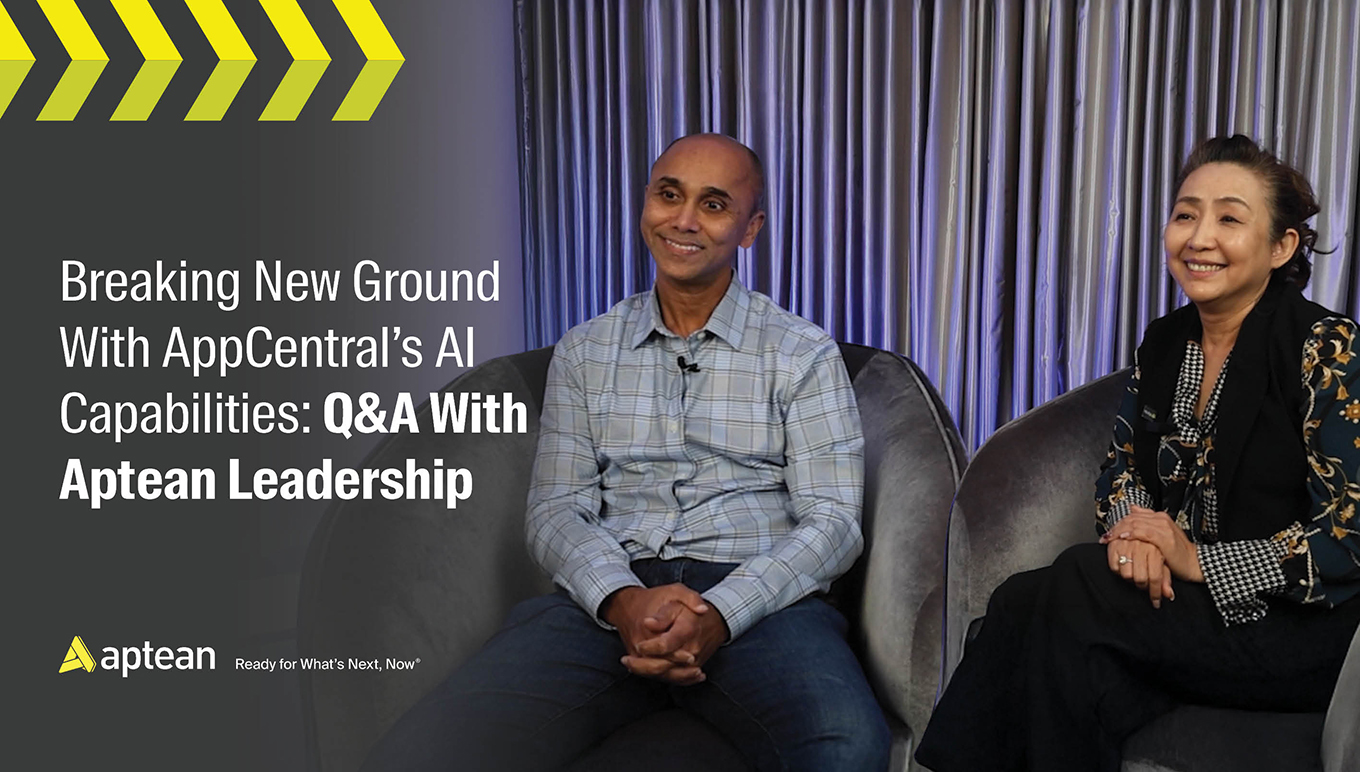Destacado en este post
Breaking New Ground With AppCentral’s AI Capabilities: Q&A With Aptean Leadership
Breaking New Ground With AppCentral’s AI Capabilities: Q&A With Aptean Leadership
Ene 21, 2025
 Aptean Staff Writer
Aptean Staff Writer 
Our revolutionary new all-in-one enterprise software platform, AppCentral, is here—and it’s already changing how our customers do business. Revealed at the Aptean UNITE customer conference in November 2024, this paradigm-shifting solution for manufacturers, processors, distributors and wholesalers has current customers and prospects alike excited to take advantage of the industry-specific apps and robust artificial intelligence (AI) that it offers.
In our previous Q&A article with TVN Reddy, Aptean CEO (TVN), and Jenny Peng, Aptean CTO (JP), we discussed how AppCentral aligns with Aptean’s mission, why it’s so significant and what it means for both our target industries and our organization. Their insights shed light on the value of vertically focused solutions, incremental enterprise software consumption and flexible modularity, all powered by robust artificial intelligence.
Here, we go a bit deeper into the development of AppCentral and the specifics of its AI functionality to help our existing and future clients understand how we built the solution, what our AI is like to use in practice and what the future holds for those who embrace this transformative platform. Both TVN and Jenny were excited to speak on these topics, knowing that Aptean has truly created something special in this new offering.
Q: What were the biggest challenges of developing a solution that nobody else has, and how did we overcome them?
JP: When we started with this idea, it's a concept that everybody understands. But as we moved further into it, there were a lot of nuts and bolts that we had to figure out. Internally, we had to think about change management, because for Aptean employees, it’s a whole new approach to how we make our solutions available to customers.
So internally, we had to look at how our teams—each with its own expertise—could come together and work together to figure out how to put together this platform. So, this was a new frontier. We had to question some assumptions we'd generally make if the apps were to be individually available versus an all-in-one ecosystem.
There was also an opportunity in realizing that it’s a unified platform. There's so much more we can do now. And that's probably the most exciting part, too—it opens up new doors for us. So not so much a challenge, because a challenge is always an opportunity.

TVN: Obviously it's a complex problem to solve—otherwise somebody would have solved it already, right? So, when we took on the AppCentral development initiative, we challenged our teams to be very creative as they built AI into it.
If you think about enterprise software, it's inherently very complex. We’ve probably made it more complicated over the decades, but ERPs are always really complex. So real innovation comes down to how we can simplify it.
By offering these very easy-to-implement apps, that changes the perspective of the product teams. They had to figure out how to take something that normally requires one or two months to implement, plus lots of back-and-forth with customers, to something that takes five days, sometimes one day to implement through just a few clicks with AI assistance or a customer success manager.
That was the hardest part of this—making apps more incrementally consumable as opposed to one big ERP implementation. We had to rethink it, come up with the apps concept, then interconnect them to deliver the value across all operations.

Q: Can you describe the AI functionalities embedded in AppCentral and their specific benefits for manufacturers and distributors?
JP: To answer, I’d like to first start with how we think about AI and what I believe to be the different stages of maturity for our AI approach as an organization. At Stage One, AI is more of an assistant. It gives you information, helps analyze data and offers insights, all to help us make better decisions.
We use AI like that a lot now. People are very familiar with ChatGPT, and now we have Copilot. Aptean has our AI Assistant to answer questions and help our customers understand product functionality.
For customers, Aptean Intelligence can use standard operating procedures to guide them in how to perform a task. But that’s also still just providing information—albeit very important information, so it’s very helpful.
“We’re starting to see the proliferation of task-based AI usage. At this stage, it’s helping all of us be more productive by saving us a lot of time.”
But as we get deeper into AI, there's actually a lot more you can do. AI can actually do things for us. There are a number of defined workflows that we can enable AI to perform for manufacturers. For example, creating a sales order—AI can create a sales document based on historical transactions. I can ask AI to adjust my routing plan when I know that a specific vehicle is not available for the day.
There are a lot of natural language or even instructional prompts that can be used to prompt AI to perform processes in our target industries. So, we are starting to see the proliferation of task-based AI usage. At this stage, it's helping all of us be more productive by saving us a lot of time. We most often see automation in conjunction with AI, and that’s allowing our team members to focus on strategic tasks.
But humans are still very deeply involved in orchestrating the actions. They're making decisions based on the information AI provides, and they're tasking AI to go perform the process, so the human still has to make the connections and account for the cascading dependencies.

We won't be able to truly maximize the value until AI becomes totally autonomous, figuring out for itself when there is a situation requiring certain actions to be performed and doing them without direction. I characterize this as an AI-led workflow, where based on a prediction, recommendation, forecast or satisfied condition, AI is able to detect the trigger and then perform a cascading set of activities and actions as a result, making its own decisions along the way.
This is where we’re really flipping things upside down, where the human becomes more of an exception handler. They're just validating what AI is doing and making sure it's done correctly. Once this orchestrated workflow based on conditions and decisions across different functions within an organization is proven, that's when the true value of the AI-led workflow can transform the manufacturing industry in terms of regular operations.
TVN: As Jenny said, the current functionality is primarily AI assistants helping people to do their tasks better. They'll grow to be AI agents that can perform a single task or a collection of tasks and workflows, which is when efficiency can really improve.
Our customers use our products extensively in their operations, end to end. So, we want them to be able to use our AI assistant and infrastructure to help themselves. Let's say they're onboarding a new employee—they can use Aptean Intelligence to learn the systems and workflows within their ecosystem. Or, if the customer uploads documents to the document management system, they can be added to the AI repository so that their employees can reference them as they’re using the ERP.
So, there's a lot more value we want to provide beyond the apps so that we can actually help our customers on this journey to effectively use the AI and get the most value out of it.

Q: What is the long-term aspiration for AppCentral?
JP: The long-term aspiration for AppCentral is to have an interconnected ecosystem with AI-led workflows. We have our purpose-built applications and integrations between them, but imagine what AI is able to do by enabling streamlined workflows and allowing operational processes to run autonomously. Humans only have to come in to intercept exceptions and perform validations.
There's so much time that we can give back to our workforce so that they can focus on strategic efforts and value-added tasks. The operational side, the back-office activities, those become autonomous, so we can just do so much more.

TVN: The aspiration for AppCentral, thinking about the 2026-27 timeframe as AI evolves to be this powerful force in driving workflows, is that there will be some customers who can do 90% of what they’re doing manually today with Aptean Intelligence. Our AI-powered apps could essentially be controlling their end-to-end operations.
Some customers will want to have more control, so they can have pauses and human checks along the way within the workflows, but they’ll still be saving an incredible amount of time and driving productivity. AppCentral will be a powerful platform that has the depth to serve specific industries while enabling automated workflows to streamline operations. It can also extend to a customer’s complete supply chain, from order entry all the way to shipping goods—and that too can be automated by a workflow powered by Aptean Intelligence.
“The most important thing is driving productivity of the individual, and from the customer side, eliminating a lot of the routine work they do. But it also helps improve our customers’ employees’ job satisfaction. So there are great outcomes for all the employees as well as the business.”
Obviously, customers will have their own journey in adopting it and releasing control. As humans, we all want to think that we know better than everybody else, and that we know better than software and AI. So, it will be a journey for some people to give up that control in exchange for efficiency.
From the app adoption perspective, I would expect any specific customer of ours—from any vertical we serve, including food and beverage, distribution, discrete manufacturing or apparel will see probably somewhere between 10 to 30 apps when they log in. They may not use all of them, but that's to be expected with very persona-driven, purpose-built apps.
The most important thing is driving productivity of the individual, and from the customer side, eliminating a lot of the routine work they do. But it also helps to improve our customers’ employees’ job satisfaction. So, there are great outcomes for all the employees as well as the business, and hopefully that turns into top-line growth and greater efficiency.

JP: An additional aspiration for AppCentral is to create a platform through which we can continuously deliver value to our customers by adding apps that will enhance the way they operate. And as they’re able to unlock that value, they get to learn about these applications, making technology easy for our customers.
Think about it: Today, everyone's trying to learn AI. Here at Aptean, we want to make that journey easy for our customers by giving them a platform with, for example, our AI assistant. We're making that technology available so that customers are able to leverage it for their own data without having to build their own AI assistant.
We want our customers to be able to focus on their business and leverage our applications for their vertical specialty. And we want to make technology more about enablement through a platform that allows them to take advantage of it in a very easy fashion.

TVN: AI is going to be a very integral part of everything we do with AppCentral. Where we are today, the end of 2024, is the beginning—we're stitching things together. As AI and Aptean Intelligence gets better and we start deploying it across all the apps on the platform, it’s going to transform the way our customers interact with software and how they do business. It’s going to drive efficiency levels to two to three times what we're seeing today.
Another big part of the whole AI journey is that, for a $25 million company, a small manufacturer, they don't have the resources required to best utilize AI. We want to be their conduit. They can use our AI-led solutions through the AppCentral platform to be able to realize the gains that AI can offer their business.

Change the Enterprise Software Game With Aptean
Aptean knows that as time marches on, the bar will be set higher and the competition will be fiercer, so we’re committed to equipping you with the tools to propel your business’s growth. With pre-integrated purpose-built apps, powerful embedded AI capabilities and time-saving process automations, AppCentral is the comprehensive, configurable and cutting-edge platform that modern organizations need.
Our first collection of apps launched is targeted for discrete manufacturers, but more are coming soon, including dedicated food and beverage, apparel and transportation bundles. We’re also dedicated to continuously innovating our existing technology and developing new apps as our customers’ needs evolve—AppCentral users can even submit ideas within the platform via the Connect feature.
Meanwhile, Aptean Intelligence will continue to evolve and grow smarter, enabling the kind of end-to-end automations that our leaders described in their responses. We’re truly changing the game when it comes to enterprise software, and we’d love to have you along for the ride.
If you have questions about AppCentral, feel free to contact us, or request a personalized demo to see the solution in action. You can also take a product tour or read the first piece in this series to learn more about Aptean’s strategy and vision for our AI-powered platform.
Póngase en contacto hoy mismo con un experto en su sector
Descubra las ventajas de un software diseñado específicamente para su sector: desde una implantación más rápida hasta una mayor eficacia en toda su empresa.



